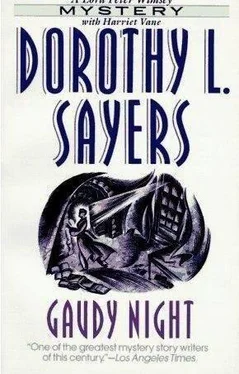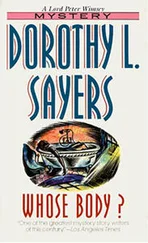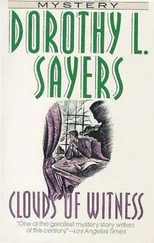Dorothy Sayers - Gaudy Night
Здесь есть возможность читать онлайн «Dorothy Sayers - Gaudy Night» весь текст электронной книги совершенно бесплатно (целиком полную версию без сокращений). В некоторых случаях можно слушать аудио, скачать через торрент в формате fb2 и присутствует краткое содержание. Жанр: Детектив, на английском языке. Описание произведения, (предисловие) а так же отзывы посетителей доступны на портале библиотеки ЛибКат.
- Название:Gaudy Night
- Автор:
- Жанр:
- Год:неизвестен
- ISBN:нет данных
- Рейтинг книги:4 / 5. Голосов: 2
-
Избранное:Добавить в избранное
- Отзывы:
-
Ваша оценка:
- 80
- 1
- 2
- 3
- 4
- 5
Gaudy Night: краткое содержание, описание и аннотация
Предлагаем к чтению аннотацию, описание, краткое содержание или предисловие (зависит от того, что написал сам автор книги «Gaudy Night»). Если вы не нашли необходимую информацию о книге — напишите в комментариях, мы постараемся отыскать её.
Gaudy Night — читать онлайн бесплатно полную книгу (весь текст) целиком
Ниже представлен текст книги, разбитый по страницам. Система сохранения места последней прочитанной страницы, позволяет с удобством читать онлайн бесплатно книгу «Gaudy Night», без необходимости каждый раз заново искать на чём Вы остановились. Поставьте закладку, и сможете в любой момент перейти на страницу, на которой закончили чтение.
Интервал:
Закладка:
He received her at Ferrara ’s with the old, quick, sidelong smile and ready speech, but with a more formal courtesy than she remembered in him. He listened with interest, and indeed with eagerness, to the tale of her journeyings abroad; and she found (as was to be expected) that the map of Europe was familiar ground to him. He contributed a few amusing incidents from his own experience, and added some well-informed comments on the conditions of life in modern Germany. She was surprised to find him so closely acquainted with the ins-and-outs of international politics, for she had not credited him with any great interest in public affairs. She found herself arguing passionately with him about the prospects of the Ottawa Conference, of which he appeared to entertain no very great hopes; and by the time they got to the coffee she was so eager to disabuse his mind of some perverse opinions about Disarmament that she had quite forgotten with what intentions (if any) she had come to meet him. In the theatre she contrived to remind herself from time to time that something decisive ought to be said; but the conversational atmosphere remained so cool that it was difficult to introduce the new subject.
The play being over, he put her into a taxi, asked what address he should give the driver, requested formal permission to see her home and took his seat beside her. This, to be sure, was the moment; but he was babbling pleasantly about the Georgian architecture of London. It was only as they were running along Guilford Street that he forestalled her by saying (after a pause, during which she had been making up her mind to take the plunge):
“I take it, Harriet, that you have no new answer to give me?”
“No, Peter. I’m sorry, but I can’t say anything else.”
“All right. Don’t worry. I’ll try not to be a nuisance. But if you could put up with me occasionally, as you have done tonight, I should be very grateful to you.”
“I don’t think that would be at all fair to you.”
“If that’s the only reason, I am the best judge of that.” Then, with a return of his habitual self-mockery: “Old habits die hard. I will not promise to reform altogether. I shall, with your permission, continue to propose to you at decently regulated intervals-as a birthday treat, and on Guy Fawkes Day, and on the Anniversary of the King’s Accession. But consider it, if you will, a pure formality. You need not pay the smallest attention to it.”
“Peter, it’s foolish to go on like this.”
“And, of course, on the Feast of All Fools.”
“It would be better to forget all about it-I hoped you had.”
“I have the most ill-regulated memory. It does those things which it ought not to do and leaves undone the things it ought to have done. But it has not yet gone on strike altogether.”
The taxi drew up, and the driver peered round inquiringly. Wimsey handed her out and waited gravely while she disentangled her latchkey. Then he took it from her, opened the door for her, said good-night and was gone.
Mounting the stone staircase, she knew that, as far as this situation was concerned, her flight had been useless. She was back in the old net of indecision and distress. In him, it appeared to have worked some kind of change; but it had certainly not made him any easier to deal with.
He had kept his promise, and troubled her very little. He had been out of Town a good deal, hard at work upon cases, some of which trickled through into newspaper columns, while others appeared to settle themselves in discreet obscurity. For six months he had himself been out of the country, offering no explanation except “business.” One summer, he had been involved in an odd affair, which had led him to take a post in an Advertising Agency. He had found office life entertaining; but the thing had come to a strange and painful conclusion. There had been an evening when he had turned up to keep a previously-made dinner appointment, but had obviously been unfit either to eat or talk. Eventually he had confessed to a splitting headache and a temperature and suffered himself to be personally conducted home. She had been sufficiently alarmed not to leave him till he was safely in his own flat and in the capable hands of Bunter. The latter had been reassuring: the trouble was nothing but reaction-of frequent occurrence at the end of a trying case, but soon over. A day or two later, the patient had rung up, apologized, and made a fresh appointment, at which he had displayed a quite remarkable effervescence of spirits.
On no other occasion had Harriet ever passed his threshold. Nor had he ever violated the seclusion of Mecklenburg Square. Two or three times, courtesy had moved her to invite him in, but he had always made some excuse, and she understood that he was determined to leave her that place, at least, free from any awkward associations. It was clear that he had no fatuous intention of making himself more valued by withdrawal: he had rather the air of trying to make amends for something. He renewed his offer of marriage on an average once in three months, but in such a way as to afford no excuse for any outbreak of temperament on either side. One First of April, the question had arrived from Paris in a single Latin sentence, starting on dispiritedly. “Num…?”-a particle which notoriously “expects the answer No.” Harriet rummaging the Grammar book for “polite negatives,” replied, still more briefly, “Benigne.”
Looking back upon her visit to Oxford, Harriet found that it had had an unsettling effect. She had begun to take Wimsey for granted, as one might take dynamite for granted in a munitions factory. But the discovery that the sound of his name still had the power to provoke such explosions in herself-that she could so passionately resent, at one and the same time, the praise or blame of him on other people’s lips-awakened a misgiving that dynamite was perhaps still dynamite, however harmless it might come to look through long custom.
On the mantelpiece of her sitting-room stood a note, in Peter’s small and rather difficult writing. It informed her that he had been called away by Chief-Inspector Parker, who was in difficulties over a murder in the north of England. He must therefore regretfully cancel their appointment for that week. Could she oblige him by making use of the tickets, of which he had no time to dispose otherwise?
Harriet pinched her lips over that last cautious sentence. Ever since one frightful occasion, during the first year of their acquaintance, when he had ventured to send her a Christmas present and she, in an access of mortified pride, had returned it to him with a stinging rebuke, he had been careful never to offer her anything that could possibly be looked upon as a material gift. Had he been wiped out of existence at any moment, there was nothing among her possessions to remind her of him. She now took up the tickets and hesitated over them. She could give them away, or she could go herself and take a friend. On the whole, she thought she would rather not sit through the performance with a kind of Banquo’s ghost disputing possession of the next stall with somebody else. She put the tickets in an envelope, dispatched them to the married couple who had taken her to Ascot, and then tore the note across and deposited it in the wastepaper basket. Having thus disposed of Banquo, she breathed more freely, and turned to deal with the day’s next nuisance.
This was the revision of three other books for a new edition. The rereading of one’s own works is usually a dismal matter; and when she had completed her task she felt thoroughly jaded and displeased with herself. The cooks were all right, as far as they went; as intellectual exercises, they were even brilliant. But there was something lacking about them; they read now to her as though they had been written with a mental reservation, a determination to keep her own opinions and personality out of view. She considered with distaste a clever and superficial discussion between two of the characters about married life. She could have made a much better thing of that, if she had not been afraid of giving herself away. What hampered her was this sense of being in the middle of things, too close to things, pressed upon and bullied by reality. If she could succeed in standing aside from herself she would achieve self-confidence and a better control. That was the great possession in which-with all his limitations-the scholar could account himself blessed: the single eye, directed to the object, not dimmed nor distracted by private motes and beams. “Private, indeed?” muttered Harriet to herself, as she smacked her proofs irritably into brown paper.
Читать дальшеИнтервал:
Закладка:
Похожие книги на «Gaudy Night»
Представляем Вашему вниманию похожие книги на «Gaudy Night» списком для выбора. Мы отобрали схожую по названию и смыслу литературу в надежде предоставить читателям больше вариантов отыскать новые, интересные, ещё непрочитанные произведения.
Обсуждение, отзывы о книге «Gaudy Night» и просто собственные мнения читателей. Оставьте ваши комментарии, напишите, что Вы думаете о произведении, его смысле или главных героях. Укажите что конкретно понравилось, а что нет, и почему Вы так считаете.












